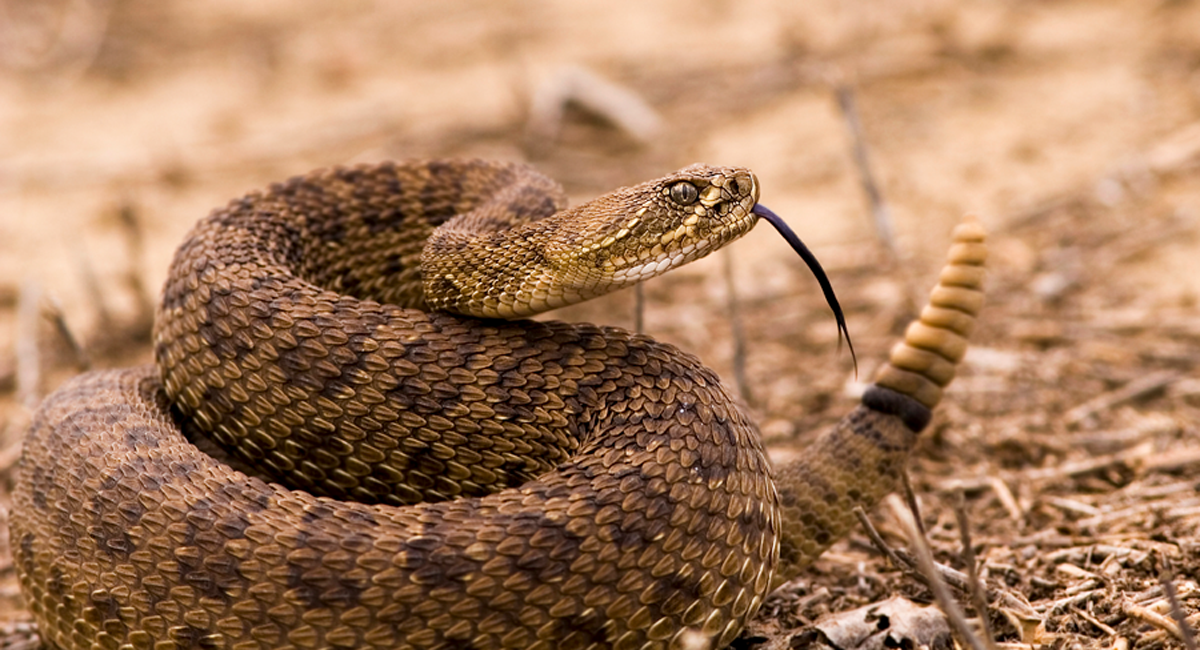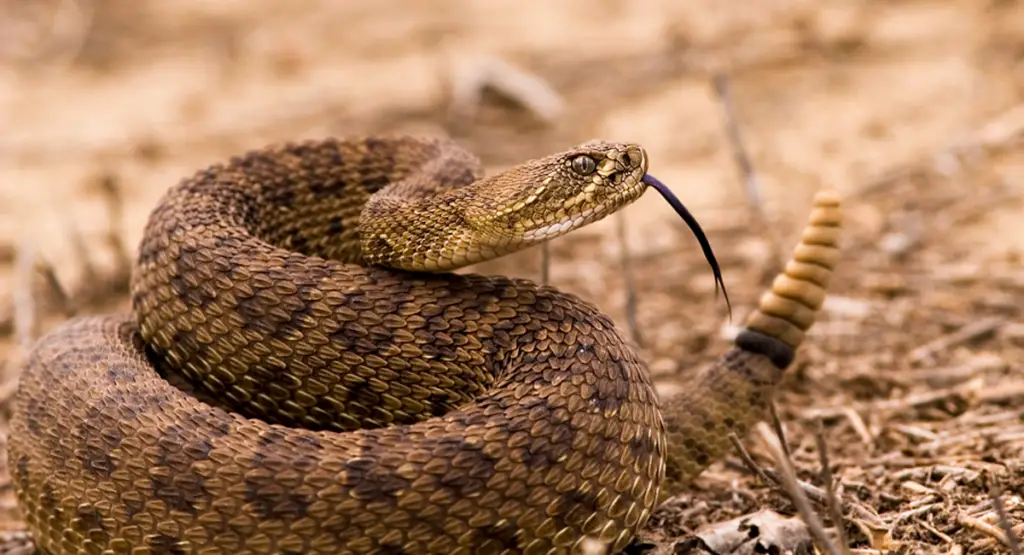Rattlesnakes are known for their venomous bite, but can it actually be deadly? The answer is yes, in some cases. While not all rattlesnake bites are fatal, it is important to understand the potential danger and take precautions when encountering these snakes.
In this article, we will explore the effects of rattlesnake venom on the human body and what to do if you are bitten. We will also discuss preventative measures, such as avoiding rattlesnake habitats and wearing protective clothing, to reduce the risk of a deadly encounter. So let’s dive in and learn more about these fascinating yet dangerous creatures.
Yes, rattlesnake bites can be deadly. The venom from a rattlesnake can cause serious health problems, including tissue damage, bleeding disorders, and respiratory failure. It’s crucial to seek medical attention immediately if you are bitten by a rattlesnake. Antivenom is available to treat rattlesnake bites, and prompt treatment can greatly improve your chances of survival.

Can Rattlesnake Bites Kill You?
Rattlesnakes are one of the most feared venomous snakes in the world, and for good reason. These snakes are responsible for many snakebite-related fatalities each year. However, not all rattlesnake bites are deadly. Whether a rattlesnake bite can kill you or not depends on several factors, including the species of rattlesnake, the amount of venom injected, and the location and severity of the bite. In this article, we will explore the risks associated with rattlesnake bites and whether they can be fatal or not.
Understanding Rattlesnake Venom
Rattlesnakes are venomous snakes that are found in various parts of the world, including North and South America. They have long, triangular-shaped heads, and their characteristic rattles on their tails make them easy to identify. Rattlesnake venom is a complex mixture of different chemicals that can cause a range of symptoms, from mild to severe. The venom is primarily used to immobilize prey, but it can also be used for self-defense.
When a rattlesnake bites a human, it injects venom through its hollow fangs. The venom travels through the bloodstream and can cause a range of symptoms, including pain, swelling, and bleeding. In severe cases, the venom can cause organ damage and even death. However, not all rattlesnakes are equally dangerous. Some species of rattlesnakes have more potent venom than others, and the amount of venom injected can also vary from bite to bite.
Types of Rattlesnakes
There are over 30 different species of rattlesnakes, and each one has a unique venom profile. Some of the most dangerous species of rattlesnakes include the Eastern Diamondback Rattlesnake, Western Diamondback Rattlesnake, and the Mojave Rattlesnake. These species are known for their potent venom and are responsible for many snakebite-related fatalities each year. However, not all species of rattlesnakes are equally dangerous. Some species have less potent venom and are less likely to cause serious harm.
Symptoms of Rattlesnake Bites
The symptoms of a rattlesnake bite can vary depending on several factors, including the species of rattlesnake and the amount of venom injected. Common symptoms of rattlesnake bites include pain, swelling, and bleeding at the site of the bite. Other symptoms may include nausea, vomiting, dizziness, and difficulty breathing. In severe cases, the venom can cause organ damage and even death.
Treatment for Rattlesnake Bites
If you are bitten by a rattlesnake, it is essential to seek medical attention immediately. The first step in treating a rattlesnake bite is to immobilize the affected limb and keep it below heart level. This can help slow the spread of venom through the bloodstream. The next step is to administer antivenom, which is a medication that can neutralize the venom and prevent further damage.
It is important to note that not all rattlesnake bites require antivenom treatment. In some cases, the symptoms may be mild, and the body may be able to fight off the venom on its own. However, if you experience severe symptoms or suspect that you have been bitten by a dangerous species of rattlesnake, it is always best to seek medical attention.
Benefits of Antivenom Treatment
Antivenom treatment is highly effective in neutralizing the venom and preventing further damage to the body. It can also help reduce the severity of symptoms and speed up recovery time. In severe cases, antivenom treatment can be lifesaving and can prevent the need for more invasive treatments, such as surgery.
Risks of Antivenom Treatment
Although antivenom treatment is generally safe, it can cause some side effects, including allergic reactions, fever, and chills. In rare cases, it can also cause more serious complications, such as anaphylaxis, which is a severe allergic reaction that can be life-threatening. However, the benefits of antivenom treatment usually outweigh the risks, especially in cases where the venom is highly potent and can cause severe harm.
Prevention of Rattlesnake Bites
The best way to prevent rattlesnake bites is to avoid contact with these snakes altogether. If you live in an area where rattlesnakes are common, take precautions to reduce your risk of encountering them. This may include keeping your yard free of clutter and debris, wearing protective clothing when hiking or camping, and keeping a safe distance if you do encounter a rattlesnake in the wild.
Vs. Other Snakebites
Rattlesnake bites are not the only type of venomous snakebite that can cause harm to humans. Other venomous snakes, such as copperheads and cottonmouths, can also be dangerous. The severity of the bite will depend on the species of snake and the amount of venom injected. However, rattlesnake bites are generally considered to be more dangerous than bites from other venomous snakes, due to the potency of the venom and the frequency of fatalities.
Summary
In conclusion, rattlesnake bites can be deadly, but not all bites are equally dangerous. The severity of the bite will depend on several factors, including the species of rattlesnake, the amount of venom injected, and the location and severity of the bite. If you are bitten by a rattlesnake, seek medical attention immediately, and follow the recommended treatment plan. With proper care, most people can make a full recovery from a rattlesnake bite and avoid serious complications.
Frequently Asked Questions
Here are some common questions about the dangers of rattlesnake bites and their potential to be fatal.
What happens when you get bitten by a rattlesnake?
When a rattlesnake bites you, venom is injected into your body through their fangs. This venom can cause a range of symptoms, including pain, swelling, and tissue damage. In some cases, the venom can also affect your nervous system, resulting in paralysis or difficulty breathing. It’s important to seek medical attention immediately if you’re bitten by a rattlesnake.
It’s worth noting that not all rattlesnake bites are the same. The amount of venom injected, the location of the bite, and the size and health of the person bitten can all impact the severity of the symptoms and the potential for long-term damage.
Can a rattlesnake bite kill you?
Yes, a rattlesnake bite can be fatal. The venom from a rattlesnake can cause severe damage to your body, including your organs and your nervous system. In some cases, the venom can also cause your blood to stop clotting, which can lead to bleeding throughout your body. If you’re bitten by a rattlesnake, it’s important to seek medical attention immediately to increase your chances of survival.
That being said, not all rattlesnake bites are immediately life-threatening. Many people who are bitten by a rattlesnake survive with prompt medical treatment and proper care.
How can you reduce your risk of being bitten by a rattlesnake?
There are a few steps you can take to reduce your risk of being bitten by a rattlesnake. First, be aware of your surroundings when you’re in areas where rattlesnakes are known to live. Rattlesnakes tend to be most active in the early morning and evening, so be especially cautious during these times. Wear protective clothing, such as long pants and boots, when hiking or working in areas with rattlesnakes.
Finally, if you encounter a rattlesnake, stay calm and give it plenty of space. Rattlesnakes will usually try to avoid humans if given the chance, so backing away slowly can help you avoid a dangerous encounter.
What should you do if you’re bitten by a rattlesnake?
If you’re bitten by a rattlesnake, it’s important to seek medical attention immediately. Call 911 or go to the nearest emergency room as soon as possible. Try to stay calm and still, as moving around can cause the venom to spread more quickly through your body. Remove any tight clothing or jewelry near the bite site, as swelling may occur.
Do NOT try to suck out the venom or cut the bite site with a knife. These methods are not effective and can actually make the situation worse. Instead, focus on getting medical help as quickly as possible.
Are there any long-term effects of a rattlesnake bite?
Depending on the severity of the bite and the amount of venom injected, there can be long-term effects of a rattlesnake bite. These can include nerve damage, scarring at the bite site, and chronic pain. Some people may also experience psychological trauma after being bitten by a rattlesnake.
However, many people who are bitten by a rattlesnake do not experience any long-term effects with prompt medical treatment and proper care. It’s important to follow your doctor’s instructions and attend any follow-up appointments to ensure that you’re healing properly.
What Happens if a Rattlesnake BITES You?
In conclusion, it is important to recognize the danger of rattlesnake bites. While not all bites are fatal, they can certainly be deadly if not treated promptly. It’s important to seek medical attention immediately if you are bitten by a rattlesnake, as the venom can quickly spread throughout your body.
However, there are steps you can take to prevent being bitten in the first place. Avoidance is key, so be aware of your surroundings and avoid areas where rattlesnakes are known to live. If you do encounter a rattlesnake, give it plenty of space and do not try to handle or capture it.
Overall, while rattlesnake bites can be a serious threat, being educated and taking precautions can greatly reduce the risk of being bitten. Stay safe and stay aware, and you can enjoy the outdoors without fear of these slithering predators.

